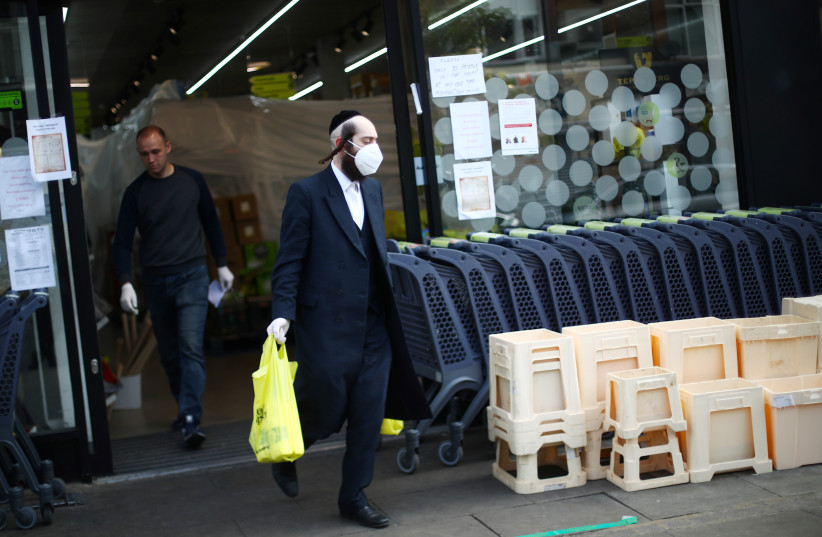The UK's National Health Service (NHS) is set to investigate the health inequalities faced by Jewish communities for the first time, the NHS Race and Health Observatory, headed by Dr. Habib Naqvi MBE, announced earlier this month.
According to a report published in The Independent following the announcement, the year-long review commissioned by the NHS Race and Health Observatory aims to examine, among other things, the low immunization rates and high COVID-19 rates across Jewish communities in the UK, as well as the heightened risk of breast cancer.
"The pandemic not only highlighted inequalities but also demonstrated that for interventions to be effective they need to be both evidence-based and community-based.”
Professor David Katz, Executive Chair of the Jewish Medical Association
The review will examine NHS engagement with Jewish communities, investigating the barriers and blind spots that may be preventing the communication of key public health messages, thus preventing the tailoring of adequate healthcare to the needs of the community.
The research will work to consider the impact of communication in several areas, including the availability of kosher hospital food, difficulties with booking appointments over Shabbat and Jewish holidays, poor experience with staff due to cultural incompetency, antisemitism from staff or patients, and end of life care for Jewish people.

No community left behind
"Deeper understanding is needed into why inequalities are continuing to persist for the Jewish population. There is clear evidence that culturally sensitive, tailored engagement and communication, delivered through the correct platforms, can yield positive results with increased access to health services and better health outcomes," said Dr. Naqvi of the decision to conduct an extensive review.
"This work will enable us to take another step towards ensuring healthcare services and interventions do not leave any of our communities behind."
In order to gain a deeper understanding of the issues, organizations within the Jewish community that have the capacity to help scrutinize the NHS are being encouraged to submit proposals examining how it engages with the community, the methods being used to deliver key public health messages and the potential barriers in distributing these health messages around areas including vaccinations, healthy eating, wellbeing and exercise.
While the invitation to submit proposals is open to all Jewish organizations, regardless of denomination, it stresses that "there are social groups within the Jewish community [and] it is important that service commissioners consider community-specific opportunities for communicating with Charedi residents."
Organizations that are interested have until November 18 to submit their proposals, and the organization selected for the job will then have 2 months to carry out an action-focused review which will "consider new insights and draw on existing evidence which shows a number of inequalities continue to persist for this population, some dating back decades," the NHS proposal reads.
The review will also consider how various guidelines and policies aimed at Jewish communities, which have twice the number of people aged over 60 compared to the general population, are implemented.
Addressing blind spots in the NHS system
"Where found, researchers will amplify leading examples of practical methods, resources, preferred channels of engagement and communication – including booking appointments during religious festivals – and signpost case studies that broadly help improve experience and treatments between patients, NHS health providers and the wider Jewish community," the proposal reads.
Reacting to the news, Professor David Katz, Executive Chair of the Jewish Medical Association, welcomed the announcement, saying: "The pandemic not only highlighted inequalities but also demonstrated that for interventions to be effective they need to be both evidence-based and community-based.”
One of the main issues that the NHS intends to examine is based on a study conducted by the London School of Hygiene & Tropical Medicine which highlights how the UK’s Orthodox Jewish community experienced higher incidences of COVID-19 infection during 2020.
Additionally, data has also shown that one in 40 Ashkenazi Jewish women have the BRCA gene mutation which can raise the risk of getting breast cancer at a younger age, along with ovarian and other cancers, something that the NHS also aims to examine in further detail.
"Deeper understanding is needed into why inequalities are continuing to persist for the Jewish population."
Dr Habib Naqvi, Director of the NHS Race and Health Observatory
Separate from the review, the NHS announced back in June that it would be launching expanded BRCA genetic testing for Jewish communities, in a bid to detect those at risk of cancer before it has a chance to develop. The expanded scheme is expected to launch early next year and will allow for people with at least one Jewish grandparent to self-refer for genetic testing.
The final report is expected to be published in March 2024 and will include evidence-based recommendations for action and highlight promising approaches where NHS health providers already lead the way with tailored information, engagement strategies and guidance on how to best care for patients from Jewish backgrounds.
